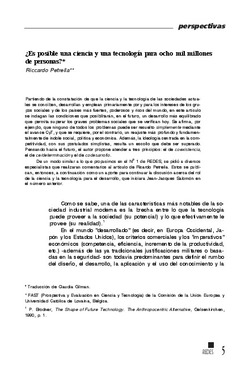¿Es posible una ciencia y una tecnología para ocho mil millones de personas?
Is it possible to have a science and technology for eight billion people?
Fecha
1994-12Autor
Petrella, RiccardoResumen
Partiendo de la constatación de que la ciencia y la tecnología de las sociedades actuales se conciben, desarrollan y emplean primariamente por y para los intereses de los grupos sociales y de los países más fuertes, poderosos y ricos del mundo, en este artículo se indagan las condiciones que posibilitarán, en el futuro, un desarrollo más equilibrado que permita superar los graves problemas sociales que se verifican hoy. Se afirma, por ejemplo, que ninguno de todos los problemas puede ser resuelto simplemente mediante el avance CyT, y que se requiere, por el contrario, un reajuste más profundo y fundamentalmente de índole social, política y económica. Además, la ideología centrada en la competitividad, con sus postulados simplistas, resulta un escollo que debe ser superado.
Pensando hacia el futuro, el autor propone atender a tres principios: el de coexistencia, el de ce/determinación y el de codesarrollo.
De un modo similar a lo que propusimos en el N 9 1 de REDES, se pidió a diversos
especialistas que realizaran comentarios al artículo de Ricardo Petrella. Estos se publican, entonces, a continuación como un aporte para continuar la discusión acerca del rol
de la ciencia y la tecnología para el desarrollo, que iniciara Jean-Jacques Salomón en
el número anterior. Starting from the notion that science and technology in modern societies are conceived, developed and used primarin in the interest of social groups and of the richest and most powerful nations in the
world, this article explores the conditions that will open the way in the future for a more balanced development that may allow the resolution of the serious social problems of today. It says, for instance, that none of these problems can be solved only by breakthroughs in science and
technology, and that a deeper readjustment is needed, basically of a social, political and financial nature. Moreover, the competition-oriented ideology, with its simplistic premises, is a hurdle that must be overcome. Thinking toward the future, the author suggests the need to bear three principles in mind: those of co-existence, co-determination, and co-development.
Just as we did in our first issue of REDES, we have asked several specialists to comment on Ricardo Petrella’s article. These comments are included here as a contribution to the furthering of the debate concerning the role of science and technology for development, a discussion started by Jean-Jacques Salomon in the last issue of REDES and which undoubtedly will go on.

